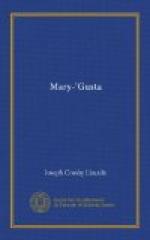Mary read and reread the long letter. Then she leaned back in her chair and with the letter in her lap sat there—thinking. She had been right in her forebodings; it was as she had expected, had foreseen: Edwin Smith, man of affairs, wealthy, arbitrary, eccentric, accustomed to having his own way and his prejudices, however absurd, respected—a man with an only son for whom, doubtless, plans definite and ambitious had been made, could not be expected calmly to permit the upsetting of those plans by his boy’s marriage to a poor “Down-Easter.” So much she had foreseen from the first, and she had never shared Crawford’s absolute confidence in his parent’s acquiescence. She had been prepared, therefore, to read that Mr. Smith had refused his consent.
But to be prepared for a probability and to face a certainty are quite different. It was the certainty she was facing now. Unless Mr. Smith changed his mind, and the chances were ten to one against that, he and his son would quarrel. Crawford had inherited a portion of his father’s stubbornness; he was determined, she knew. He loved her and he meant what he said—if she would have him he would marry her in spite of his father. It made her proud and happy to know that. But she, too, was resolute and had meant what she said. She would not be the cause of a separation between father and son. And, besides, marriage had become for her a matter of the distant future; for the present her task was set there at South Harniss.
What should she do? It was hard for Crawford, poor fellow. Yes, but it was hard for her, too. No one but she knew how hard. He would write her again telling her that his decision was unchanged, begging her to say she loved him, pleading with her to wait for him. And she would wait—Oh, how gladly, how joyfully she could wait—for him!—if she knew she was doing right in permitting him to wait for her. If she was sure that in permitting him to give up his father’s love and his home and money and all that money could buy she was justified. There is a love which asks and a love which gives without asking return; the latter is the greater love and it was hers. She had written Crawford that perhaps she was not sure of her feeling toward him. That was not true. She was sure; but because she was fearful that his knowledge might be the means of entailing a great sacrifice on his part, she would not tell him.
What should she do? She considered, as the little Mary-’Gusta used to consider her small problems in that very room. And the result of her considerations was rather unsatisfactory. There was nothing she could do now, nothing but wait until she heard again from Crawford. Then she would write.




